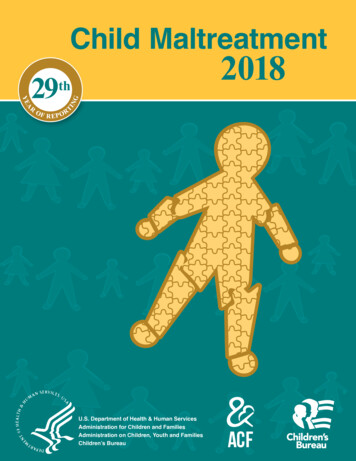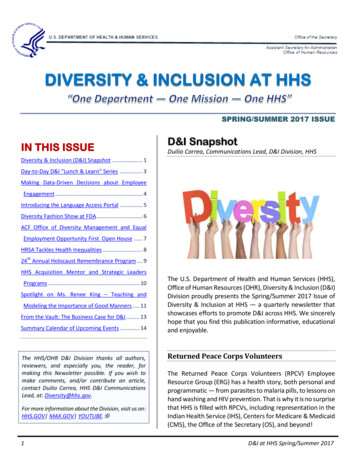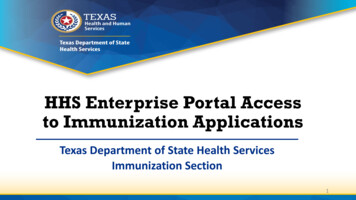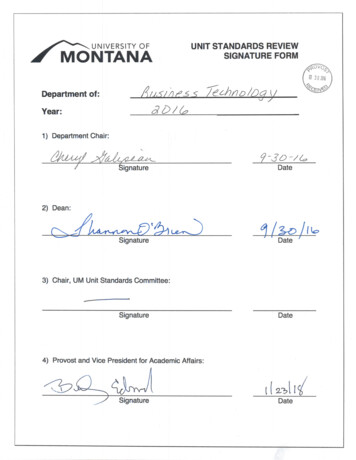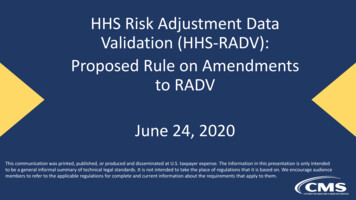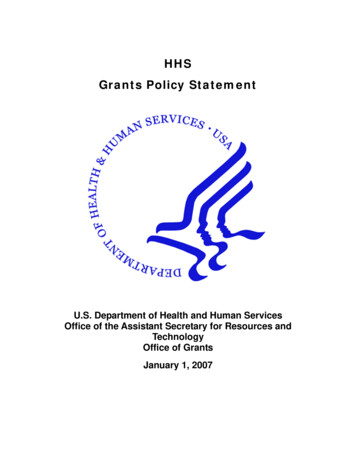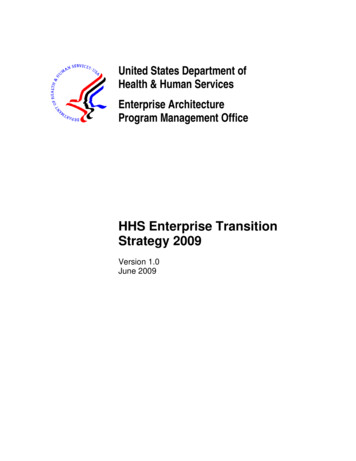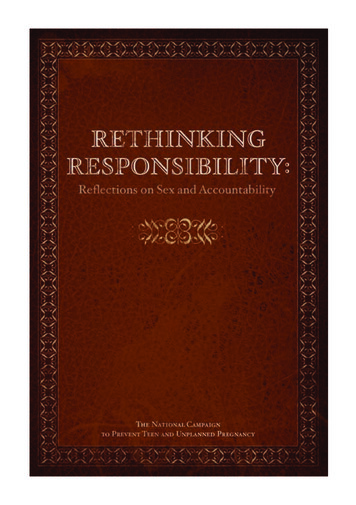
Transcription
RethinkingResponsibility:Reflections on Sex and Accountability
This project was supported by many, but became a reality because of theuntiring and dedicated work of a few. In particular, deep appreciation isoffered to:The William and Flora Hewlett FoundationWilliam G. GalstonVivian BerryhillChelsey StorinBelle SawhillSarah BrownAndrea KaneJessica SheetsBill AlbertAnd of course,The EssayistsReaders should note that the following essays are presented inalphabetical order according to the author’s name. The essays do notnecessarily reflect the views of The National Campaign to Prevent Teenand Unplanned Pregnancy and are meant to spark conversations aboutthe intersection between personal responsibility and the decisions youngpeople make about sex.ISBN#: 1-58671-072-9 Copyright 2009 by The National Campaign to Prevent Teenand Unplanned Pregnancy. All rights reserved.Suggested citation: Rethinking Responsibility: Reflections on Sex andAccountability. (2009). Washington, DC: The National Campaignto Prevent Teen and Unplanned Pregnancy
RethinkingResponsibility:Reflections on Sex and Accountabilitywww.TheNationalCampaign.org
Personal Responsibility, Religion,and Values Advisory GroupChairMarysa NavarroAranguren, Ph.D.Barbara DafoeWhiteheadSenior FellowBrookings InstitutionBoard ChairCatholics for Free ChoiceVice-ChairRev. Father Michael D.Place, STDAuthor and Co-DirectorThe National MarriageProjectWilliam Galston, Ph.D.Vivian BerryhillPresident & FounderNational Coalition ofPastors’ SpousesSenior Vice PresidentSocial Mission& Ministerial DevelopmentResurrection Health CareMembersFred M. RileyElayne BennettCommissionerLDS Family ServicesPresident & FounderBest Friends FoundationRev. Thomas DavisChairPlanned Parenthood ClergyAdvisory BoardDr. Robert M. FranklinPresidentMorehouse CollegeKay HymowitzWilliam E. Simon FellowThe Manhattan InstituteRev. Dr. Kenneth S.Robinson, M.D.PastorSaint AndrewAfrican MethodistEpiscopal ChurchRev. Sam RodriguezPresidentNational Hispanic ChristianLeadership ConferenceMelissa RogersHealth Program ConsultantCMK Health Marketing& AssociatesVisiting Professor ofReligionand Public PolicyWake Forest UniversityDivinity SchoolRev. Sterling LandsYonce SheltonRon JenkinsSenior PastorGreater Calvary BaptistChurchSister Christine Mura,DCHispanic Outreach &Pastoral CareSt. Mary’s Hospital,Amsterdam, NYProgram Director,Search-USASearch for Common GroundRev. Dr. Carlton VeazeyPresident & CEOReligious Coalition forReproductive ChoiceAlma T. Young, MSW,Ed.DAssistant Clinical Professor,Department of Communityand Preventative MedicineMount Sinai Schoolof Medicine
Board of DirectorsChairmanThe HononorableThomas H. KeanChairman, The RobertWood Johnson FoundationCEO, THK ConsultingChairman, The CarnegieCorporation of New Yorkformer Governor ofNew JerseyPresidentIsabel V. Sawhill, Ph.D.Senior Fellow, EconomicStudiesThe Brookings InstitutionCEO & TreasurerSarah S. BrownMembersRobert Wm. Blum,M.D., Ph.D.Maria EchavesteVictoria P. SantSenior FellowCenter for AmericanProgressPresidentThe Summit FoundationDaisy Expósito-UllaDirector, PopulationProgramThe William and FloraHewlett FoundationChairman and CEOd’expósito & partnersWilliam Galston, Ph.D.Senior Fellow,Governance StudiesThe Brookings InstitutionRon Haskins, Ph.D.Senior Fellow,Economic StudiesCo-Director, Center forChildren and FamiliesThe Brookings InsitutionSenior Consultant, TheAnnie E. Casey FoundationNancy L. JohnsonWilliam H. Gates Sr.Professor and ChairDepartment of Populationand Family Health SciencesJohns Hopkins UniversitySenior Public PolicyAdvisorFederal Public Policy andHealthcare GroupBaker, Donelson, Bearman,Caldwell & Berkowitz, PCThomas S. ChappellJudith E. JonesSenior ManagerGoodman & Company,LLP.Linda ChavezChairmanCenter for EqualOpportunityVanessa Cullins, M.D.,M.P.H., M.B.A.Vice President forMedical AffairsPlanned ParenthoodFederation of America, Inc.Susanne DanielsPresidentLifetime EntertainmentServicesClinical ProfessorMailman Schoolof Public HealthColumbia UniversityJody Greenstone MillerPresident and CEOThe Business Talent GroupReverend FatherMichael D. Place, STDSenior Vice PresidentSocial Mission &Ministerial DevelopmentResurrection Health CareDiane Rowland, Sc.D.Executive DirectorKaiser Commissionon Medicaid and theUninsuredSara Seims, Ph.D.Matthew Stagner, Ph.D.Executive DirectorChapin Hall Centerfor ChildrenUniversity of ChicagoMary C. TydingsManaging DirectorRussell Reynolds AssociatesRoland C. WarrenPresidentNational FatherhoodInitiativeStephen A. WeiswasserPartnerCovington & BurlingGail R. Wilensky, Ph.D.Senior FellowProject HOPEKimberlydawn Wisdom,M.D.Surgeon General,State of MichiganVice President,Community Health,Education & WellnessHenry Ford Health SystemJudy WoodruffSenior CorrespondentThe News Hour withJim Lehrer
Forewordby Bill Galston and Vivian BerryhillFrom its beginning more than a decade ago, The NationalCampaign has viewed teen pregnancy as a complex, multi-faceted human issue, and the recent expansion of the Campaign’smission to include unintended pregnancy among individuals in their 20s has added new dimensions of complexity.Attempting to address these issues without looking at familybackground, social and economic factors, cultural signals, andpublic policy responses would be, at best, a misleading exercise. On the other hand, it would be a mistake to ignore whatlies in the hearts of those individuals who at various stages ofmaturity are making decisions that will shape their lives. Wehave no choice but to engage the profound, often mysteriousphenomenon of human personhood and agency.It was to that end that The National Campaign establisheda task force (now an advisory group) on Religion and PublicValues as one of its founding endeavors. From its inception,this group, which brings together representatives of differentfaiths as well as scholars and practitioners who grapple withthe central moral issues of contemporary culture, has searchedfor a path beyond the culture wars that have dominated thepast generation of debate about social issues. While we know
that philosophical differences will persist concerning theappropriateness and effectiveness of different policyresponses, we have always sought common ground on themessage that adults — especially those in positions ofpolitical and cultural authority — should be sending to teensand young adults who are often adrift without a moralcompass and who are besieged with images that glorifyimpulsiveness and hyper-sexuality.One key element of that message — personal responsibility — is the subject of this publication. We have asked members of the advisory group as well as civic leaders from aroundthe nation to contribute their reflections on the meaning ofpersonal responsibility in general and as it pertains to sexuality.While the authors approach their task from varying pointsof view, they agree on one thing: it is a gross distortion to seehuman behavior simply as a response to external conditions.To be sure, young people’s expectations about their futureinevitably affect the decisions they make here and now. Thosewhose background has given them little hope for a brighterfuture may not believe that they have much to lose by acting inways that narrow their horizons still further. That is why TheNational Campaign has always stressed the balance betweenindividual and social responsibility.Nearly all the great religions (and secular moral systems aswell) affirm the reality of human agency and choice. Throughtheir teaching mission, most have tried to fortify the aspectof human personhood that strives for dignity and self-respect,even in dire circumstances, and is capable of overcoming
obstacles that seem insuperable. If they are successful, theycan water the seed of hope that lies dormant in so many youngpeople today. We hope that in some modest way, this publication can contribute to that mission, on which so much of ourcountry’s future will depend.
Table of ContentsElayne Bennett — Conflicted Messagesp. 1Michael Carrera — Creating a Responsible Climatep. 7Rev. Tom Davis — Variable World of Personal Responsibilityp. 9Cassandra L. DeBenedetto — Personal Responsibility: A Choicep. 11E.J. Dionne — Indivisiblep. 15Rev. Debra W. Haffner — A New Sexual Ethicp. 19Ron Haskins — The Sequence of Personal Responsibilityp. 23Kay S. Hymowitz — A Simple Definition?p. 27Marie C. Johns — Responsibility to Self and Servicep. 31Tom Joyner — It Takes a Villagep. 33Rev. Sterling Lands — A Belief Systemp. 37Carol Platt Liebau — Too Much, Too Soonp. 41Amber A. Madison — A Double Standardp. 45Karlo Barrios Marcelo — Who is Responsible?p. 49Will Marshall — Aligning Policy with Social Responsibilityp. 53Amie J.McLain — Teenage Responsibilityp. 57Janet Murguía — Take Notice and Actp. 59Cecile Richards — Back and Forth Responsibilityp. 61Fred M. Riley — A Moral Codep. 65Rev. Samuel Rodriguez — A Crucial Intersectionp. 69Will Saletan — A Second Sexual Revolutionp. 73Joah Spearman — No Excusesp. 75Laura Sessions-Stepp — Spiderman Doctrinep. 81James Wagoner — A Healthy Paradigmp. 85Jim Wallis — A Moral Centerp. 87Roland C. Warren — Personal Responsibility: It Has a Nice “Ring” to Itp. 89Jessica Wechter — Creating a Culture of Responsible and Safe Sexp. 91Kimberlydawn Wisdom — Reflectionsp. 95Alma T. Young — Everyone is Responsiblep. 99Paula Parker-Sawyers — Some Final Thoughts p. 101
Reflections on Sex and AccountabilityConflicted MessagesElayne BennettPresident & Founder, Best Friends FoundationFor the past several decades, personal freedom resonated asthe message of the day and overshadowed any mention of personalresponsibility. This cultural shift gave rise to numerous consequences as evidenced by heightened sexual activity at earlier ages,alarming rates of sexually transmitted infection (STI), and largenumbers of children raised in single-parent households. Whatsuffered during this period was the notion of personal responsibilityand respect for ourselves and others.In the context of teen pregnancy prevention, what does itmean to be personally responsible? Research shows that children arelikely to have the best outcomes when born into a stable, two-parentfamily.1 The decision of whether and when to become pregnantshould optimally occur in the context of marriage between a husbandand wife who will determine how they will plan for their family.Given the bleak statistics — teenage mothers often do not completeschool, increasing the probability that they and their children willlive in poverty2 — it is difficult to imagine how our culture wouldever condone producing children outside the boundaries of marriageand family and deem it “responsible.” Organizations that promote“comprehensive” sex education would argue that personal responsibility means to use birth control/condoms. In Emerging Answers1
Rethinking Responsibility2007, Doug Kirby reports that 30% of teens ages 15-19 who rely onoral contraception do not take a pill every day, which is necessary forprotection.3 Is it realistic to expect sexually active adolescents to be“personally responsible?”Most would agree that teens are not ready for pregnancy andparenthood. The point of disagreement lies in whether youthprograms should address preventing the pregnancy by dispensingcontraception, or preventing the sexual activity which leads topregnancy. I believe the most responsible approach is to reduce thesexual activity.Two critical areas which must be addressed are: (1) the influenceof media on popular culture and (2) the lack of clear and consistentmessages from adult authority figures, i.e. parents, teachers, clergy, etc.Teens are bombarded with messages from movies, television,and music that glorify sex, violence, and drug and alcohol use. It hasbeen said that next to parents, television is perhaps a child’s mostinfluential teacher. A recent study reported that the average childspends nearly 45 hours per week with media, compared with 17 hourswith parents.4 Primetime programming is heavily weighted withsexual references and innuendoes. Another study found that “verbalreferences to non-married partners outnumbered scenes depictingor implying sex between married partners by a ratio of nearly four toone.”5 Nevertheless, nine out of 10 students in a 2007 Best Friendsstudent survey want to be married someday. This indicates that ourchildren still see marriage as a valuable goal. Why, then, is so littleattention given to helping them reach that goal? The major mediahas simply not responded to the viewer’s preference for family showsthat depict positive relationships and healthy marriages.2
Reflections on Sex and AccountabilityEqually important are the policies of authority figures thatsignificantly influence student’s risk behaviors. Some experts recommend that condoms be distributed in high school or even middleschool because “kids are going to have sex anyway.” Is this a responsible policy? Not so, according to Jim Munn, track coach at thenow infamous Gloucester High School, where 17 girls got pregnantlast spring. In a letter to the Gloucester Daily Times editor he wrote,“Kids drink too. So why not also dispense alcoholic beverages to thestudents, and give them a ‘safe place’ to booze it up such as thehigh school field house ”6Studies indicate the interconnectedness of sexual risk behaviors with other negative outcomes such as drugs and alcohol use.7Certainly, adults in positions of authority are behaving responsiblywhen they clearly and consistently advise adolescents to reject allrisky behaviors related to sex, drugs, and alcohol. Should young children be taught how to play safely with matches? The consequencesof adolescent premarital sexual activity are no less serious.The difference in approach lies in one word — expectation.Given the right information and guidance by caring adults, youthare capable of making good decisions. Research confirms that youthrespond to the challenge of high expectations by making positivechoices and setting goals for their future. The Adolescent & FamilyHealth journal (Spring 2005) compared the research study of approximately 200 Best Friends girls to the Youth Risk Behavior Survey ofnon-participating peers in D.C. Public Schools. This comparisonfound that Best Friends participants were: (1) two times less likely touse alcohol, (2) eight times less likely to use drugs, (3) more than twotimes less likely to smoke, and (4) more than six times less likely tohave sex.83
Rethinking ResponsibilityUltimately, teen sexual activity is an issue of character. It isa question of what kind of human being one wants to become.According to character education expert Thomas Lickona, in aculture often hostile to sexual restraint, adolescents must have asense of ethical and moral competence if they are to exercise sexualself-respect and self discipline.9 When these components are inplace they are more likely to make good decisions and are betterprepared for meaningful relationships, which are important factorsfor a successful life.After more than 30 years of working with students, I am convinced that young people really want to do the right thing. Whencharacter is not taught, children lack the foundation to exercisepersonal responsibility and are ill-equipped to make decisions thatmay affect them and others. Our youth deserve an opportunity todevelop these skills and have a childhood before they have a child.Unfortunately, sexual activity and drug and alcohol use rob childrenof this opportunity.The Best Friends Foundation has risen to the challenge of positive youth development through implementation of our researchbased programs which represent the real “comprehensive” approachto adolescent health and character development. Our children’sfuture is at stake. If we give our children our best, they will surelyrespond with their best.Footnotes1. Waite, L.J., & Gallagher, M. (2000). The Case for Marriage: Why MarriedPeople are Happier, Healthier, and Better off Financially, pp. 124-140.Doubleday, New York, NY.2. Kirby, D. (2007). Emerging Answers 2007: Research Findings on Programsto Reduce Teen Pregnancy and Sexually Transmitted Diseases, pg. 12.Washington, DC: National Campaign to Prevent Teen andUnplanned Pregnancy.4
Reflections on Sex and Accountability3. Ibid., pg. 124. Common Sense Media, “Media Child and Adolescent Health: A SystematicReview”, November 2008.5. Bozell, L. Brent, “TV’s Contempt for Marriage”, Washington Post,August 27, 2008.6. Munn, J., “Distributing Contraceptives No Answer to Complex Problems”,Gloucester Daily Times (August 4, 2008).7. Shrier, L.A., Emans S.J., Wood, E.R., & Durant, R.H. (1997) The Associationof sexual risk behaviors and problem drug behaviors in high school students.Journal of Adolescent Health, 20(5), 377-383.8. Lerner, R. (2005) Can Abstinence Work: An Analysis of the Best FriendsProgram. Adolescent & Family Health, Vol 3. No. 4, 185-192.9. Lickona, T. and Davidson, M. (2005). Smart & Good High Schools:Integrating excellence and ethics for success in school, work, and beyond.Cortland, N.Y.: Center for the 4th and 5th Rs (Respect & Responsibility)/Washington, D.C.: Character Education Partnership.Elayne Bennett serves as the President and Founder of the Best FriendsFoundation. In addition to teaching the Foundation’s abstinence curriculumand training educators throughout the country, Mrs. Bennett serves as aspokeswoman on issues of adolescent behavior and development. Mrs. Bennettdeveloped the Best Friends program in 1987, and due to the overwhelmingdemand for a boys’ program, she launched Best Men in 2000. She earned herB.A. and M.Ed. from the University of North Carolina Chapel Hill.5
Reflections on Sex and AccountabilityCreating a Responsible ClimateDr. Michael CarreraDirector, The Children’s Aid SocietyAdolescent Pregnancy Prevention ProgramPersonal responsibility within the context of pregnancy planning and prevention is not a stand alone, separate concept or set ofbehaviors centering on sexual expression and a reproductive healthchoice. Responsible sexual and reproductive behavior is informed byour overall core values as they apply to all dimensions of our life. Assuch, personal responsibility as a driver in life is vitally conditionedby spiritual, cultural, intellectual, and emotional dimensions as well asthe biological. Accordingly, while pregnancy planning and preventionare important ways of expressing responsible sexuality, this behaviorrepresents only one aspect of a much wider human expression.The development of a personal sense of responsibility isinformed and influenced by numerous factors. Family, in particulara parent or other present, caring adult, significantly helps individuals develop responsible, equitable, caring values. These valuesunderlie choices and decision-making of all kinds throughout earlydevelopment, the teen years, and on to adulthood.Specifically, family influences foster the healthy development ofself esteem in females and males.1 When a young person feels valuedand prized as a person and family member, and experiences emotional safety, those feelings increase their belief that their destinyis in their own hands, and that life and relationships are not simply7
Rethinking Responsibilitya series of things that just happen: it helps them understand thatcertain behaviors result in certain outcomes; that there are causes andeffects over which they have control; and that not hurting themselvesor others is a personal responsibility that contributes to the commongood of family and society.2 Accordingly, in the realm of makingchoices that are not risky and conveying respect, responsibility, andequity in relationships, appropriate self esteem development looms asessential in the hierarchy of a young person’s thoughts and behavior.Parents and family members have no choice about their influence in helping develop the self esteem of their children and familymembers — their only choice is whether they do it well or poorly.In summary, a fundamental understanding for all of us, parents,educators, and policy makers is that we do not prevent unplannedpregnancies, risky, or irresponsible sexual behavior — young peopledo. What we do is create a climate, an atmosphere in our homes,communities, and in our country where young men and womenbelieve that a joyful, gratifying life is ahead of them, and they possessthe capacity to achieve fulfillment. This understanding by youngmen and women increases the odds that personal responsibilitywithin the context of pregnancy planning and prevention is morelikely to be realized.Footnotes1 Carrera, Michael. Lessons For Lifeguard, New York, Donkey Press 19962 Classroom Management Resources Site, California State University, EDE1414 EDSE 415 March, 2009Dr. Michael A. Carrera is Director of The Children’s Aid SocietyAdolescent Pregnancy Prevention Program. For 25 years this program hasserved thousands of young people in New York City and other geographiesaround the country. The Carrera Adolescent Pregnancy Prevention Programis a term evidence-based program serving adolescent boys and girls.8
Reflections on Sex and AccountabilityVariable World of PersonalResponsibilityRev. Tom DavisChair, Planned Parenthood Clergy Advisory BoardWith the possible exception of parents, no group issues moreexhortations to personal responsibility than we clergy. An estimateof the effectiveness of those appeals was given by the social ethicistReinhold Niebuhr. While he loved to preach, he did not thinkthat people are changed by sermons. He believed that we are moreinfluenced by the moral atmosphere of the society around us.When considering the issue of personal responsibility, it seemswise to recognize that much depends on the moral and social matrixin which each individual tries to live. For example, if young peopleare raised in families that are basically functional and caring, go onto higher education, have financial resources backing them, andhave a real future, then it is reasonable to expect them to take agreat deal of personal responsibility. If they do not wish to havechildren before they are further along in their careers, they shouldbe responsible by using birth control. If, however, other youngmen and women have few if any of these supports, are living liveswith few opportunities and little hope, then it is understandable,if sad, that they may not care enough about themselves to exercisesimilar care. In such a situation, demanding personal responsibilitywithout the provision of social supports may not be realistic. Even9
Rethinking Responsibilitythough such personal responsibility would be in their own self-interest, young men and women may have simply given up on themselves.These are the young people to whom life just “happens.”With this in mind, it seems clear that social policies can makepersonal situations such as unintended pregnancies either betteror worse. Things might be somewhat improved if federal and stategovernments spent more money on programs to make contraceptionmore affordable and available. While that and similar measures couldbe helpful, they are only a part of what is needed. Research done byThe National Campaign to Prevent Teen and Unplanned Pregnancyand other groups has shown that the mere act of giving people contraception does not automatically solve the problem. What mattersmore than that is that they have realistic prospects for their life andcareer. When those are present, people are far more likely to takeresponsibility and avoid unintended pregnancies.Providing such “realistic prospects” is a tall order for anycomplex society, but these kinds of programs have been successfulbefore. The GI Bill of Rights put millions of World War II veteransthrough college at a time when many, if not most, of them wouldnever have gone to college. Personal responsibility alone could nothave put those men and women in college.The more our society is able to break the cycle of poor schools,weakened families, and limited prospects, the more it will strengthentheir sense of personal responsibility and reduce unintended pregnancy.The Rev. Tom Davis is currently the chair of the Planned Parenthood Federation ofAmerica Clergy Advisory Board. He is a minister in the United Church of Christ. A nativeof Scranton, PA, he is a graduate of Dartmouth College and Union Theological Seminaryin New York City. He received his Ph.D. from Duke University. He is the author of SacredWork: Planned Parenthood and Its Clergy Alliances, Rutgers Press, 2005.10
Reflections on Sex and AccountabilityPersonal Responsibility:A ChoiceCassandra L. DebenedettoFounder, Anscombe Society, Princeton UniversityHaving recently graduated from Princeton University andnow working with college undergraduates across the country onmatters of sex and relationships, I am more than familiar with themessages of “sexual responsibility” being taught at today’s universities. Here, “sexual responsibility” is understood to consist of twothings. First, it means using contraception to prevent pregnancyand the spread of sexually transmitted infections (STIs). Second,it means receiving consent from the other person before engaging in sexual activity. Many students accept these teachings anddirect their own behaviors according to them. Whether theyare sexually active with a committed significant other or they aresexually active with multiple un-committed partners, as long asthey use contraception and receive consent they believe they arebeing responsible. However, there is also a growing population ofcollege students who regard this message of “sexual responsibility”as overly-simplistic, misleading, and even harmful. They believetoday’s universities (and, indeed, much of the broader culture) aresettling for a type of “damage control” in matters of sexuality. Thisis actually a severe disservice to young men and women because itassumes they cannot exercise responsibility — with respect to the11
Rethinking Responsibilitycause of the “damage” — in their sexual choices and behaviors.The truth is, to prevent pregnancy, reduce the spread of STIs,and prevent sexual assault, we need to encourage a type of personalresponsibility that extends deeper than current messages to use contraception and gain consent. It is common knowledge that condomsand the Pill are not a guarantee against pregnancy, with roughly 20%of women experiencing an unplanned pregnancy within the first yearof condom use.1 Additionally, condoms only limit the spread of someSTIs, leaving young men and women (especially women) vulnerableto diseases that can severely cripple their health and their ability togive birth to healthy children in the future.2 Not to mention thatsome women have serious reservations about using the Pill whenresearch has linked its use to immune system suppression,3 as well asan increased chance of cancer, tumors, heart attacks, and infertility.4Even students who are not personally opposed to contraception stillbelieve that encouraging its use within a “safe sex” or “sexual responsibility” program gives a false impression of safety, protection, andresponsibility. For them, personal responsibility in matters of sexuality includes not only guarding against unfavorable consequences, buteven more so being responsible with the very decisions and behaviorthat lead to those consequences in the first place.Many young men and women today desire encouragement,resources, and support to be personally responsible sexually bychoosing abstinence. For them, personal responsibility in mattersof sexuality means understanding the long-term consequences ofone’s choices and behavior, both for oneself and for others, includingone’s future spouse and children. Although marriage and family maynot be on the minds of most teenagers and college students, thereis no reason why it shouldn’t be when getting married and having12
Reflections on Sex and Accountabilitychildren is a reality for the vast majority of people. Young peoplemust understand that children do best when raised within a stable,intact family (i.e. when raised by a biological mother and father whoare committed to each other in marriage).5 Furthermore, they mustunderstand that the best preparation for achieving a stable marriageis limiting one’s sexual partners to one person, that person beingone’s spouse.6 This means that for young men and women, personalresponsibility means setting a goal of preparing for a healthy andstable marriage and family, and staying committed to that goalthrough abstinence.In this light we can easily see that choosing abstinence is nota decision made out of fear of contracting STIs or conceiving achild. Instead, choosing abstinence means embracing a lifestylecommitted not only to one’s own immediate well-being, but to thewell-being of one’s future family.In matters of sex, we cannot settle for a type of responsibilitythat merely attempts to cover up irresponsible decisions. Rather,we must commit ourselves to a vision of love and sexuality thatfosters greater hope for the future.Footnotes1. Trussell, J. “Contraceptive efficacy.” In Contraceptive Technology:Nineteenth Revised Edition. Ed. R.A. Hatcher et al. New York, NY: ArdentMedia, 2007.2. See Unprotected: a campus psychiatrist reveals how political-correctness inher field endangers every student by Miriam Grossman, M.D.3. Blum, M. et al., “Antisperm antibodies in young oral contraceptive users,”Advances in Contraception 5. Netherlands: Kluwer Academic Publishers,1989. Pages 41-46.4. Wilson, Mercedes. Love and Family. San Francisco: Ignatius. Pages 271-272.5. When compared to other family structures, children and adolescents livingin intact families (married-biological-parent families) tend to report lowerlevels of psychological distress, lower levels of behavioral problems, and13
Rethinking Responsibilitygreater academic success. Falci, Christina, “Family Structure, Closenessto Residential and Nonresidential Parents, and Ps
Wake Forest University Divinity School Yonce Shelton Program Director, Search-USA Search for Common Ground Rev. Dr. Carlton Veazey President & CEO Religious Coalition for Reproductive Choice Barbara Dafoe Whitehead Author and Co-Director The National Marriage Project Alma T. Young, MSW, Ed.D Assistant Clinical Professor, Department of Community
